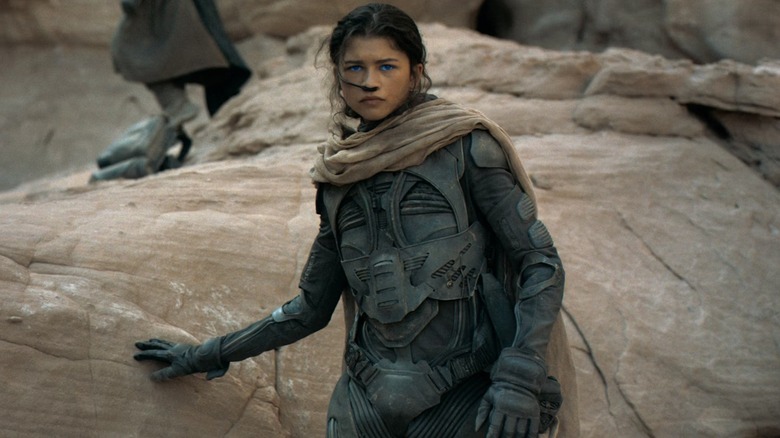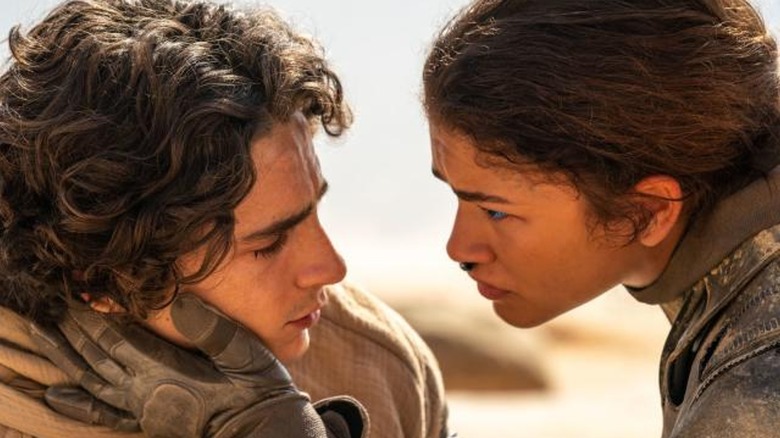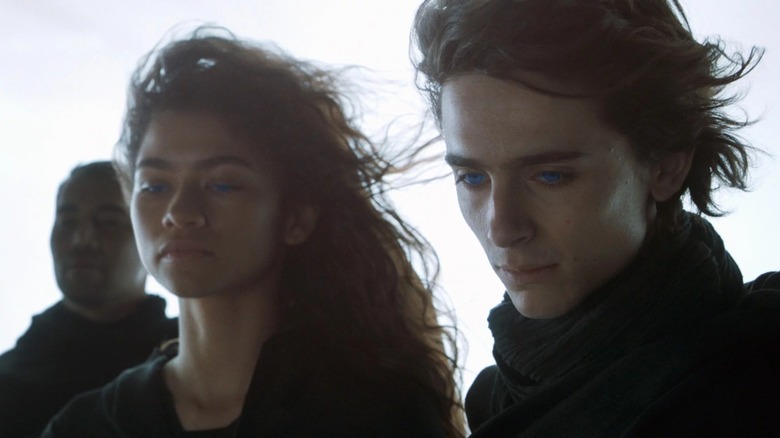
This post contains spoilers for the “Dune” book series.
Dennis Villeneuve’s “Dune” doesn’t open with an aerial view of Caladan or an introductory shot of Paul Atreides (Timothée Chalamet). Instead, we hear a voice: Chani (Zendaya) sets the tone for the “Dune” saga to come by talking about her home planet, Arrakis, and how beautiful it is. However, she is quick to underline the looming threat of colonizers and the disenfranchisement of the Fremen. “The outsiders ravage our lands in front of our eyes[…] Their cruelty to my people is all I’ve known,” she states, rooting us in her perspective by prefacing Paul’s story with a dire warning.
Our first impression of Chani through Paul’s eyes — both in Frank Herbert’s book “Dune” and Villeneuve’s first “Dune” movie — is in the form of dreams. Paul’s budding prescience makes him dream of Arrakis even before he sets foot on the desert planet, but Chani is the only Fremen he sees in those dreams. When Paul talks about her in the books, he notices her striking blue eyes (a Fremeni trait due to concentrated spice mixed in the air) and that she refers to him as “Usul.” Usul, of course, is the private name Paul would go on to adopt while living with the Fremen in the future, with Chani often using it as an endearment for her lover.
Surface-level interpretations of Chani might paint her as merely Paul’s love interest, but there’s more to her than being a stepping stone for Paul’s ascension to Messiah. Even in the books (where she is consistently aligned with Paul’s objectives), Chani is a ruthless and fierce player in the “Dune” narrative, ready to fight to the death to protect her loved ones. Here’s what happens to her in Herbert’s “Dune” novels.
The many faces of Chani in the Dune books
Right after Paul and Lady Jessica are forced to navigate Arrakis on foot (after the Atreides coup), they encounter Stilgar and a group of Fremen, including Chani. As the Fremen surround them, Chani has a projectile weapon aimed right at Paul, who is a stranger to her people at this point. Paul reconciles the girl in his dreams with the one in front of her, but there is a massive dissonance between his visions and reality. While Dream Chani is sweet and tender, the real Chani is initially brazen and guarded, often looking down upon Paul when he struggles to grasp the Fremen’s ways. This is not to say that Chani doesn’t help Paul integrate better; she is simply wary of outsiders, given the bloody history of Arrakis’ colonizers in the “Dune” universe.
Once Paul proves his worth and earns the title of Muad’Dib, he and Chani develop a friendship that gradually transforms into a romantic bond. Even as his lover, however, Chani is not afraid to question Paul or take matters into her own hands when it comes to combat. For example, when a challenger wishes to duel Paul, Chani intervenes and kills the outsider without consulting him, as she is fiercely loyal and sufficiently capable as a warrior. “I am no longer a child hunting scorpions in the sietch by the light of a handglobe, Usul. I do not play games,” she states coolly, stunning Paul with the intensity of her affections. Moreover, Paul’s mastery over the desert and the sandworms is all thanks to her, as she also teaches him how to hunt and cook amidst such harsh, unfavorable conditions.
Soon after, Paul and Chani’s first son, Leto II, is brutally murdered during a Corrino raid on their home. This grief devastates both, prompting Paul to ingest the mysterious Water of Life, after which he falls into a lengthy coma. Chani, once again, becomes the key to reviving his consciousness, and this accelerates Paul’s path toward becoming the so-called Messiah.
Chani’s heartbreaking fate in Dune Messiah
To note, Villeneuve’s “Dune: Part Two” omits the birth and death of Leto II completely, and Paul’s decision to ingest the Water of Life solely hinges on his wish to test the prophecy surrounding the Kwisatz Haderach. Here, Chani helps him survive the test but is skeptical of his abrupt rise to power, which culminates in the Fremeni victory over Houses Harkonnen and Corrino. Chani’s attitude towards Paul after this ceremony is what makes Villeneuve’s version different, as Herbert’s Chani is a deeply religious figure who supports the Fremeni fanaticism bolstering Paul. While Villeneuve’s Chani completely rejects Paul’s claim to the throne (and his political marriage to Princess Irulan) by making her distaste clear, Herbert’s Chani accepts her position as Paul’s official concubine without protest. These differences do make Herbert’s Chani more traditional than the picture Villeneuve has etched so far, and it remains to be seen how Chani’s arc in the latter’s take on the story unfolds.
Circling back to Chani’s fate in the books, she suffers immensely after her move to Arrakeen Palace, as her status as concubine interferes with the Bene Gesserit breeding program. Irulan has her meals laced with contraceptives to prevent Chani from giving birth, although the latter counteracts this by ingesting high doses of spice melange. Unfortunately, the spice complicates her pregnancy in the lead-up to the birth of her and Paul’s preborn twins Ghanima and Leto II. Ultimately, the concentrated spice in her system, combined with the trauma of such a difficult childbirth, leads to Chani’s death soon after.
In the “Dune” books, Chani is more than Paul Atreides’ destined lover. She is also ecologist Liet-Kynes’s daughter, a Sayyadina (religious priestess) deeply involved with Fremeni mysticism, and someone who dreams that Arrakis’ dunes will turn into a lush oasis. That said, would her tragic fate be any different if she had challenged Paul’s not-so-veiled status as yet another colonial oppressor? Perhaps Villeneuve’s upcoming “Dune Messiah” can answer this rather difficult question.




Leave a Reply